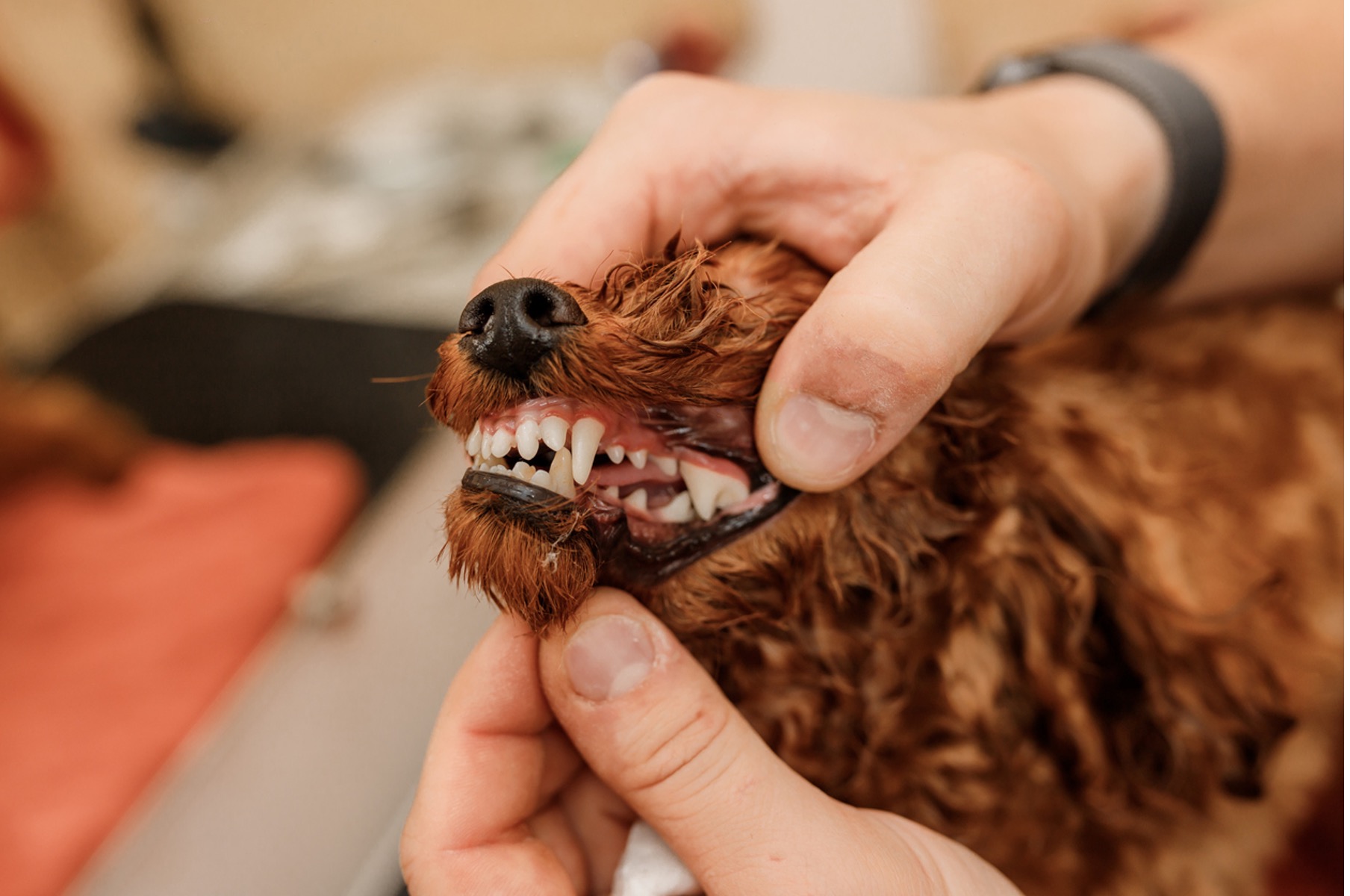Pet dental health is a critical aspect of overall wellness for our furry companions, often overlooked but profoundly essential. Like humans, pets require regular dental care to prevent oral diseases and ensure their well-being. Unfortunately, pet dental health myths abound, leading many pet owners astray. Debunking these myths is essential to understanding the significance of proper dental care for our beloved animals, ultimately enhancing their quality of life and longevity.
In this article, we debunk some common myths and cover what every pet parent needs to know to keep their pet’s teeth healthy. Keep reading and be sure to catch the videos on how to clean your pet’s teeth at home and what to expect when your pet gets professional dental cleaning. Let’s get started.
Debunking Pet Dental Health Myths
There are some myths and misconceptions surrounding pet dental health. Let’s debunk some of the most common ones:
- Pets don’t need dental care: According to the American Veterinary Dental Society, by age 3 your dog or cat will likely have some early evidence of periodontal disease, which will worsen as your pet grows older if you do not take preventive measures to prevent the disease. Early detection and treatment are critical because advanced periodontal disease can cause severe problems and pain for your pet.
- Dry food cleans pets’ teeth: While dry food may have some abrasive action on teeth, it is not enough to maintain proper dental hygiene. Regular brushing and professional cleanings are essential for complete dental care.
- Dental problems only affect older pets: Dental problems can occur at any age, even in young pets. Starting dental care early on can help prevent dental issues.
- Give a dog a bone: Pets can break or crack their teeth on bones, especially if the bones are too hard or if the pet chews them aggressively. Bones can splinter or fracture, causing injury to the pet’s mouth, teeth, or digestive tract. Dental toys or chews are much safer options.
- Dogs and cats with dental pain will not eat: A pet may have difficulty eating with dental pain, but due to their survival instincts, they will typically eat even when suffering from tooth pain. Please do not assume your pet has no tooth pain because you see them eating.
The Importance of Pet Dental Health
A fundamental reason pet dental health is important is its ability to inhibit the accumulation of plaque and tartar on pets’ teeth. Bacteria in your pet’s mouth combine with food particles to create a sticky film called plaque. Plaque hardens into tartar due to mineral deposits in your pet’s saliva. Tartar provides a surface for bacteria to thrive. If left untreated, tartar buildup can lead to gum disease, tooth decay, and even tooth loss.
Neglecting your pet’s dental health can also affect its general health. Studies have shown that poor dental hygiene in pets can lead to systemic infections, affecting the entire body rather than just the mouth. When pets have dental problems, bacteria from their mouths can enter the bloodstream and travel to organs like the heart, liver, and kidneys. This bacteria can contribute to heart, liver, and kidney disease.
Dental Diseases in Dogs and Cats
Tartar, especially below the gumline, is damaging and sets the stage for infection and damage to the jawbone and the tissues that connect the tooth to the jawbone. Following are types of diseases in dogs and cats resulting from dental care:
- Gingivitis: Inflammation of the gums is a common early sign of dental issues caused by plaque and tartar accumulation on the teeth.
- Periodontal Disease: This disease is an advanced stage of gingivitis. Inflammation extends to the supporting structures of the teeth. It can lead to tooth loss and affect overall health. According to the NIH: Periodontal disease is one of the most common diseases affecting dogs and cats over 3 years of age.
- Broken or Fractured Teeth: Dogs and cats may break or fracture their teeth, especially if they chew on hard objects.
- Oral Tumors: While relatively rare, tumors can develop in the mouth, affecting dental health.
- Tooth Resorption: Tooth resorption is when the body slowly breaks down and absorbs a tooth. It’s not clear what causes it, but special cells called odontoclasts, which usually help remodel teeth, become too active. This makes them destroy the tooth, starting from the root and moving inward. We’re not sure what triggers this but being older or having dental problems can make it more likely.
- Juvenile Gingivitis:
Juvenile gingivitis can happen in young kittens and puppies, especially in kittens. We’re not sure why it occurs in pets too young to have lots of tartar on their teeth. It might be because of genetics or their immune system being too sensitive to bacteria on their teeth. This sensitivity causes their gums to get red, sore, and later, worn away. Treatment is keeping the teeth as bacteria-free as possible and supporting the pet’s immune system.
Watch for Signs of Dental Problems in Your Pets
Pets are experts at hiding their pain, which makes it essential for pet owners to be observant and recognize the signs of dental problems. Here are some common signs that indicate your pet may be experiencing dental issues:
- Bad breath: Persistent bad breath, often described as “fishy” or “rotten,” can indicate dental problems in pets.
- Red, swollen, or bleeding gums: Inflamed or bleeding gums may indicate gum disease or other dental issues.
- Difficulty eating or chewing: If your pet is having trouble eating or chewing, it may be due to tooth pain or discomfort caused by dental problems.
- Pawing at the mouth: Pets experiencing dental pain may paw at their mouth to alleviate the discomfort.
- Drooling excessively: Excessive drooling can be a sign of dental issues, especially if accompanied by other symptoms such as bad breath or difficulty eating.
- Changes in behavior: Dental pain can cause changes in your pet’s behavior, including irritability, aggression, or reluctance when you touch around the mouth.
If you notice any of these signs in your pet, please contact us so we can examine its teeth. Early detection and treatment can prevent further complications and maintain your pet’s dental health.
Being Proactive About Your Pet’s Dental Health
Proactively preventing dental problems in your pet is critical to ensuring their long-term dental health. Here are some preventive measures you can take to maintain your pet’s dental wellbeing:
- Brush their teeth daily: Daily brushing of your pet’s teeth is easier and quicker than you may think, and it is essential to their dental care routine. Click on the picture below and watch this instruction video from the American Veterinary Medical Association:
- Give Your Pet Dental Chews: Dental chews can help remove plaque and tartar buildup.
- Provide Your Pet with Chew Toys: Dental chew toys are specifically designed to help clean your pet’s teeth. They often have textured surfaces that can help remove plaque and tartar.
- Please bring your pet in regularly for wellness checks so we can check their teeth for signs of dental problems and other critical factors for your pet’s health..
- Bring your pet in to Aspen Veterinary Clinic for professional teeth cleaning.
Please click on the picture below to watch this informative video from the AVMA about veterinarian dental cleanings:
Conclusion: Making Your Pet’s Dental Health a Priority
We’ve explored how maintaining proper dental care for your furry companions helps prevent oral diseases and improves their overall well-being and longevity. Recognizing the signs of dental problems and being proactive about preventive measures, including daily brushing, providing dental chews and toys, and scheduling regular professional cleanings, are vital to ensure your pets lead healthy and happy lives.
Remember, your pet relies on you to care for its dental health. By investing in its dental care, you are investing in its quality of life. So, take the necessary steps to ensure your pet’s teeth and gums stay healthy, and they will thank you with a lifetime of hello meows and barks.
Contact us now if you have any questions or need to schedule your pet’s next appointment.
Your Caring Team

